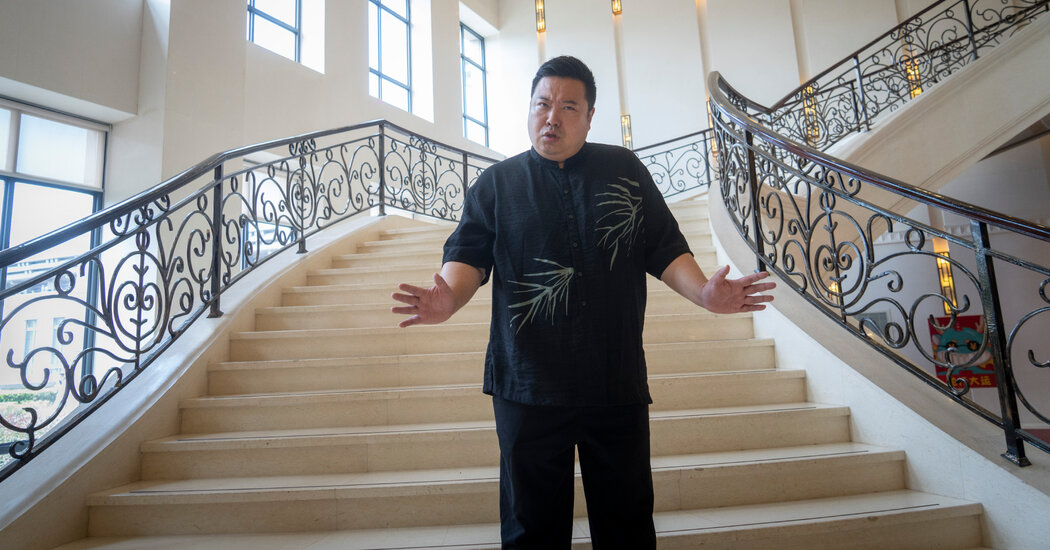Copyright The New York Times

Ryan Chen has never set foot in the United States. He learned English at high school in the western Chinese city of Chongqing and from watching pirated versions of “Friends,” “Two and a Half Men” and other sitcoms in college. Yet he has made a name for himself as “Chinese Trump,” attracting millions of fans on social media in China and abroad with his pitch-perfect impersonations and gentle ribbing of the president of the United States. China has for decades excelled at mimicking American ways, producing a flood of knockoff fashion and fantasy. Even the ruling Communist Party has joined in, packaging its ambitions for the country as the “China Dream,” copying, at least in wording, its great rival’s “American dream.” But Mr. Chen, 42, the business manager at an architectural design firm in Chongqing, has taken imitation to a new level — and not as a form of flattery. He said he always had a flare for mimicry and got in trouble at school for imitating teachers. He mastered the idiosyncratic cadences of the American president’s speech, and his fixations and hand gestures by watching video clips and studying Trump impersonators like Matt Friend, an American comedian. “I’m not trying to offend anyone and just want to be funny,” said the entertainer, whose name in Chinese is Chen Rui, in an interview in Chongqing. He said he would never impersonate Chinese leaders, who tend to be very stiff in public and bereft of comedic quirks. They also don’t play to his principal strength — accent-free English. One example of Mr. Chen’s oeuvre is a short video he posted from a visit to the Great Wall of China near Beijing on Douyin, the Chinese equivalent of TikTok, where he has 1.2 million followers. In it, Mr. Chen appears on the wall in character as Mr. Trump, observing that “it is a lot better than our wall” and had successfully kept out the “Mexi-golians,” a combination of Mexican and Mongolian. Told by a companion that “Mexi-golians” don’t exist, he quickly recovers his clueless stride, asking of the Great Wall: “Did they make the Mongolians pay for it?” His videos have Chinese subtitles though his shtick depends heavily on nonverbal elements like his Trump-like scowl and pout. He can also do former presidents Biden and Obama and Vice President JD Vance but thinks they are “too normal” for good comedy. Noting that “I have to be careful,” he said he steers clear of politics, both American and Chinese. “Chinese people don’t really care about politics,” he said, but do care about Mr. Trump as entertainment. Tony He, a Chongqing resident and clothing store owner who is a big fan of Mr. Chen, said he understood the need for caution. “He is smart. It is dangerous to talk about politics,” Mr. He said. Chinese people, he added, are fascinated with Mr. Trump for his character, not his politics, which currently include a threat to impose 100 percent tariffs on Chinese goods to punish China for what the president called “sinister and hostile” policies. “For many Chinese, Trump is not good or bad, but he is always interesting,” Mr. He said. “His words, his thinking are not the same as other American presidents.” Chinese law bans the commercial use of the names and images of party leaders, a rule that landed a Mao Zedong impersonator in trouble in 2018. That actor wore a gray Mao suit and mockingly mimicked Mao’s thick Hunan accent, prompting outrage on social media from fans of China’s revolutionary leader and an apology from conference organizers. Mr. Chen, the Trump impersonator, said: “I’m just an imitator and know my place.” “My principle is that if it is not funny, it is not worth it,” he added, noting that he thought Mr. Trump’s speech at the United Nations was “too boring.” His biggest headache, he said, is figuring out how to make money from this talent, a task made more difficult by a Chinese plagiarist in California who lifted his Trump videos from Douyin and reposted them on TikTok, which is inaccessible in China. This meant that the copycat could benefit from a TikTok rewards program that is closed to Mr. Chen, who, as a Chinese national, is not eligible. He has earned some money from Chongqing Beer and other Chinese companies whose products have been featured in his videos. A Chinese electric carmaker paid him to attend an auto show in Munich this summer. But Mr. Chen still has had trouble monetizing his celebrity. “This is the fundamental question: How do live streamers get rich?” he said. China’s official media no longer delight in mockery of foreign leaders as they did in the past. But social media platforms, though rigorously censored, have been flooded with unfettered ridicule of the American president, including A.I.-generated videos that show Mr. Trump, Mr. Vance, Secretary of State Marco Rubio and Elon Musk working on production lines in grimy factories. Mr. Chen said it was never his intention to make Mr. Trump look like a fool or give ammunition to his political enemies in the United States, who feast on caricatures of the president as a buffoon or an unhinged would-be dictator. “They think I’m making fun of Trump, but I’m not making fun of anybody,” he said, adding that he only wanted to “get attention” and let Westerners see a rambunctious, humorous side of Chinese life that he thinks foreigners too often miss. Mr. Chen said he would like to visit the United States at some point and, if possible, even meet his alter-ego, which he said would help boost traffic. He said he first turned to social media as a “backup plan,” concerned that the long, painful crash of China’s once-booming property market would hurt his prospects hawking architectural design services. His first foray into vlogging — a series of short videos offering tips on how to lose weight — flopped: He gained weight after trying various diet plans and only managed to get a few hundred followers. “If you don’t get results, you don’t get followers. I learned this the hard way,” he said. “I am fat and don’t make any excuses,” he added. He then tried producing videos teaching English, which were more successful but still not what he was hoping for. Mr. Chen turned to imitating Mr. Trump early this year shortly after the president’s inauguration, calculating that their shared weight issues and his talent for imitation made this a promising route to social media celebrity. “There is nobody more famous than Trump,” he said, recalling that he had watched “The Apprentice” as a student at a university in Chengdu, the capital of Sichuan Province, and has long found Mr. Trump amusing.



